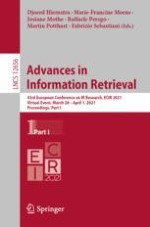2021 | OriginalPaper | Buchkapitel
On the Instability of Diminishing Return IR Measures
verfasst von : Tetsuya Sakai
Erschienen in: Advances in Information Retrieval
Aktivieren Sie unsere intelligente Suche, um passende Fachinhalte oder Patente zu finden.
Wählen Sie Textabschnitte aus um mit Künstlicher Intelligenz passenden Patente zu finden. powered by
Markieren Sie Textabschnitte, um KI-gestützt weitere passende Inhalte zu finden. powered by
